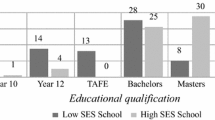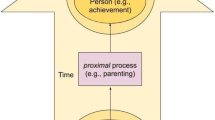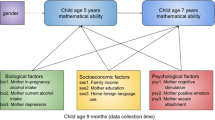Abstract
Analysis of the scholastic achievement of 150 white pre-teen-age boys and girls in relation to their mothers' aspirations for them, selected socialization practices, and their social origins helps explain disparities in scholastic achievement between working class and middle class children as well as disparities in achievement within the working class. Mothers in this stratum, as a rule, do not articulate high educational and occupational aspirations for their children, especially for girls. Yet, girls exhibit significantly higher achievement than boys and their achievement is conditioned more by maternal aspirations than that of boys. Girls' greater responsiveness to their mothers' aspirations and their higher scholastic ability are due to the fact that white working class mothers engage in more early interaction and employ less coercive discipline with daughters than with sons. Boys' achievement is more responsive to variations in maternal practices than to maternal aspirations. Although not typical, mothers who interact much with their sons early in life and who do not employ coercive discipline produce high-achieving sons. Otherwise, they do not, whatever aspirations they hold for their sons. For girls, maternal aspiration is the more critical determinant of achievement. Downwardly mobile women, those working class women with middle class origins, differ from the stable women in their stratum in that they have equally high aspirations for daughters and sons. As a result of their mothers' high aspirations and more enlightened practices, the daughters of downwardly mobile women are the highest achievers in the white working class. Their sons, however, are underachievers, mainly because downward mobiles adopt the prevailing pattern of their class of destination and rely more on coercive discipline in socializing boys.
Similar content being viewed by others
References
Carliner, L. (1970). Young worker, old worker cross eyes. Paper presented at the Annual Meeting of the Society for the Study of Social Problems, Washington, D.C.
Gordon, M., and Gordon, A. (1971). The I.Q.-achievement gap: A reformulation of the problem. Paper presented at the American Sociological Association Annual Meeting, Denver, Colorado.
Hyman, H. (1953). The value systems of different classes: A social psychological contribution to the analysis of stratification. In Bendix, R., and Lipset, S.M. (eds.),Class, Status, and Power, Free Press, New York, pp. 426–442.
Kohn, M.L. (1970).Class and Conformity: A Study in Values. The Dorsey Press, Homewood, Illinois, p. 190.
Komarovsky, M. (1962).Blue Collar Marriage. Random House, New York.
Rainwater, L., and Handel, G. (1964). Changing family roles in the working class. In Shostak, A., and Gomberg, W. (eds.),Blue Collar World, Prentice-Hall Inc., Englewood Cliffs, New Jersey, pp. 70–76.
Author information
Authors and Affiliations
Additional information
This research is supported by Welfare Administration, HEW, under grants CRD-371-C2-9 and 10-P-56018/5-4.
A revised and extended version of a paper given at the Society for the Study of Social Problems, August 1970, under the title, “White Working Class Women and Their Families.”
Received Ph.D. in Sociology from Columbia University, New York, New York. Major present research interests are structural determinants of variations in patterns of socializing children, intergenerational changes in socialization practices and beliefs, and the effects of family structure and socialization on children in different structural contexts.
Rights and permissions
About this article
Cite this article
Blau, Z.S. Maternal aspirations, socialization, and achievement of boys and girls in the white working class. J Youth Adolescence 1, 35–57 (1972). https://doi.org/10.1007/BF01537063
Received:
Issue Date:
DOI: https://doi.org/10.1007/BF01537063




